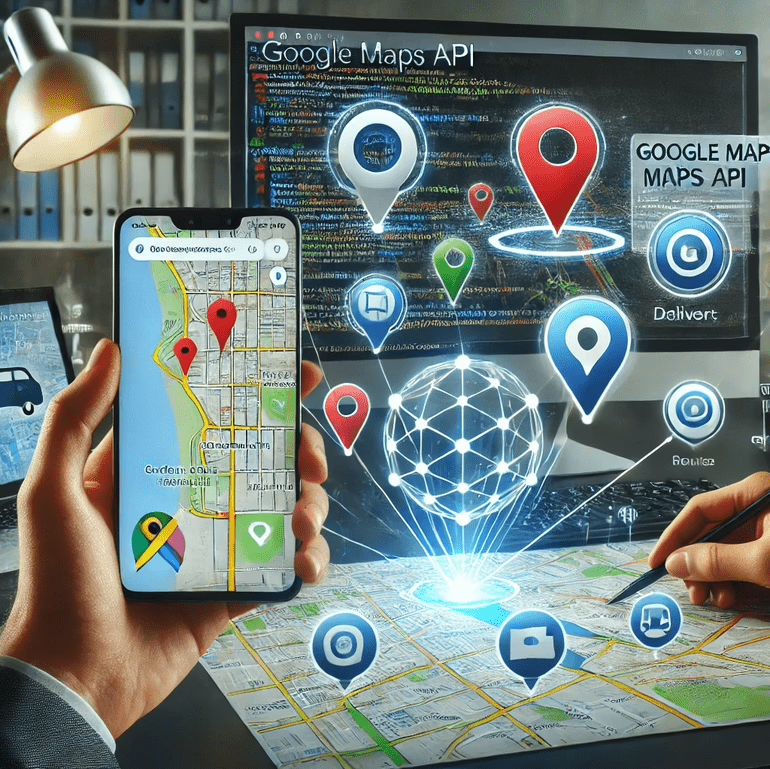In an era where data and connectivity drive every aspect of our daily lives, location-based services have become indispensable. From tracking delivery routes to finding the nearest restaurant, businesses across industries are leveraging geographic data to improve user experiences and streamline operations. At the heart of this geolocation revolution is Google Maps API, a versatile and powerful tool that enables developers to integrate Google Maps’ functionality into web and mobile applications.
The Google API offers a comprehensive suite of tools that allow businesses to build everything from interactive maps and location-based search features to detailed navigation systems and real-time geolocation services. This flexibility makes it a valuable asset for companies across sectors such as e-commerce, transportation, logistics, real estate, and more. In this blog, we’ll explore the Google Maps API’s features, why it’s essential for businesses, and how Curate Consulting Services can help organizations find the right talent to harness its potential.
What is the Google Maps API?
The Google Maps API is a collection of tools provided by Google that developers can use to add mapping and location-based services to websites and mobile apps. These APIs give developers access to a wide range of functionalities, including interactive maps, location data, navigation, and place information. By integrating Google API into an application, businesses can provide real-time directions, track deliveries, enable location-based searches, and much more.
Google APIs are frequently used across many industries to enhance user experiences, provide precise geographic data, and offer seamless interaction between digital applications and the real world.
Why Google Maps API is Essential for Businesses
Whether you’re a startup building a mobile app or an enterprise optimizing global logistics operations, Google Maps API offers the flexibility and tools you need to enhance your digital services. Here are several key reasons businesses should consider integrating Google Maps API:
1. Custom Interactive Maps
One of the biggest advantages of Google Maps API is its ability to create custom, interactive maps. Using the Maps JavaScript API, developers can embed highly customizable maps into their websites or apps. These maps can be tailored with custom markers, overlays, polygons, and polylines, giving businesses the ability to highlight important locations, boundaries, or routes relevant to their services.
For instance, a real estate website can use interactive maps to show available properties, neighborhood boundaries, and points of interest such as schools or parks. Logistics companies can visually plot delivery routes, while travel websites can feature custom maps showing tourist attractions, hotels, and restaurants.
2. Efficient Navigation and Directions
Businesses in the transportation, delivery, and ride-sharing industries depend heavily on accurate navigation and directions. The Google Maps Directions API provides detailed, step-by-step directions for various modes of transportation—whether it’s driving, walking, biking, or public transit. It also includes real-time traffic data, ensuring that users receive the most efficient routes and estimated travel times.
For companies running logistics operations, the Distance Matrix API calculates travel distances and times between multiple points, helping optimize delivery routes and estimate arrival times. With this tool, businesses can offer more accurate delivery windows and improve operational efficiency.
3. Geolocation and User Tracking
The Geolocation API allows businesses to determine a user’s exact location based on data from Wi-Fi signals and cell towers. For mobile apps, this is especially valuable for features like geo-tagging, location-based notifications, and localized services. For example, a food delivery app can use the Geolocation API to match users with nearby restaurants and estimate delivery times based on their location.
In addition, the Geocoding API helps convert physical addresses into geographic coordinates (latitude and longitude), enabling more precise location tracking and improving services like address validation and geolocation searches.
4. Enhanced User Experience with Places API
For businesses looking to provide their users with comprehensive location-based information, the Places API is an invaluable tool. This API grants access to rich details about millions of locations, including business names, addresses, reviews, and opening hours. It is especially useful for applications like travel booking platforms, restaurant finders, and local service directories.
The Places API not only improves the user experience by providing detailed place information but also offers capabilities such as autocomplete for address inputs, streamlining user interactions.
5. Custom Styling and Branding
Another unique feature of the Google Maps API is the ability to style maps to match the branding of your application or website. Using Maps Styling, developers can adjust the colors, change map types, and add custom markers to fit the look and feel of their brand. This ensures that while providing users with the practical functionality of Google Maps, the map design remains cohesive with your overall user interface.
6. Integration with Street View
Google’s Street View allows businesses to provide their users with immersive, 360-degree imagery of real-world locations. This is a valuable feature for industries like real estate, tourism, and hospitality, where giving users a realistic view of their destination can significantly enhance the decision-making process.
By integrating Street View into an app or website, users can virtually explore areas in detail, making it easier to understand environments before visiting in person.
Curate Consulting Services: Helping Businesses Find Specialized Talent
As companies continue to harness the power of geolocation and mapping technologies, having the right team of developers with expertise in the Google Maps API is critical for project success. Curate Consulting Services specializes in connecting businesses with top-tier talent skilled in geospatial technologies, front-end development, and JavaScript frameworks required to make the most of tools like Google Maps API.
For Businesses:
- Tailored Recruitment: Curate Consulting Services helps you find highly skilled developers with expertise in integrating Google Maps API into web and mobile platforms. We understand that each project has unique requirements, and we work to match your business with talent that has the right technical proficiency and industry knowledge.
- Custom Solutions: We provide consulting services to guide you through complex API integrations, helping you build or optimize your location-based services and map-related features.
- Industry Experience: From real estate to transportation, logistics to travel, our industry-specific expertise ensures that you get professionals who understand the specific challenges and opportunities within your field.
For Candidates:
- Exciting Opportunities: If you’re a developer looking to work with cutting-edge geolocation services, mobile apps, and mapping technologies, Curate Consulting Services connects you with forward-thinking companies ready to push the boundaries of what’s possible with Google Maps API.
- Career Growth: Working on projects that involve Google Maps API opens up exciting opportunities in geospatial data, web development, and mobile applications, giving you a competitive edge in the rapidly evolving tech landscape.
Real-World Use Cases of Google Maps API
Many successful companies rely on Google Maps API to power their services:
- Uber and Lyft use it for real-time navigation and route optimization for their ride-sharing services.
- Airbnb integrates interactive maps to show available properties and highlight local attractions.
- Domino’s Pizza uses it for delivery route optimization, ensuring hot and fast pizza deliveries.
- Zillow incorporates custom maps to display real estate listings along with nearby amenities like schools, parks, and shopping centers.
These examples show how businesses across industries can leverage Google Maps API to enhance their offerings and improve operational efficiencies.
Conclusion: Embracing the Power of Google Maps API with Curate Consulting
The Google Maps API is a game-changer for businesses looking to integrate mapping and location-based services into their web and mobile applications. Its versatility, real-time data capabilities, and customization options make it an essential tool for businesses aiming to deliver rich user experiences and optimize their operations.


